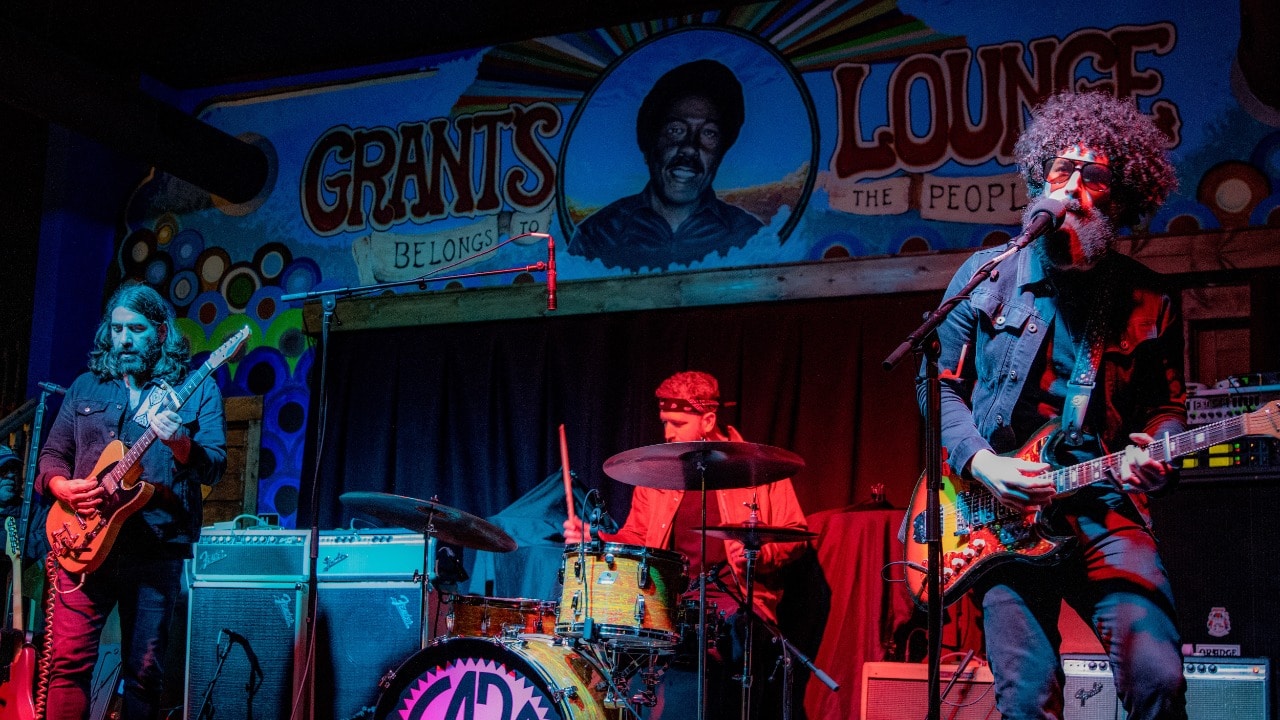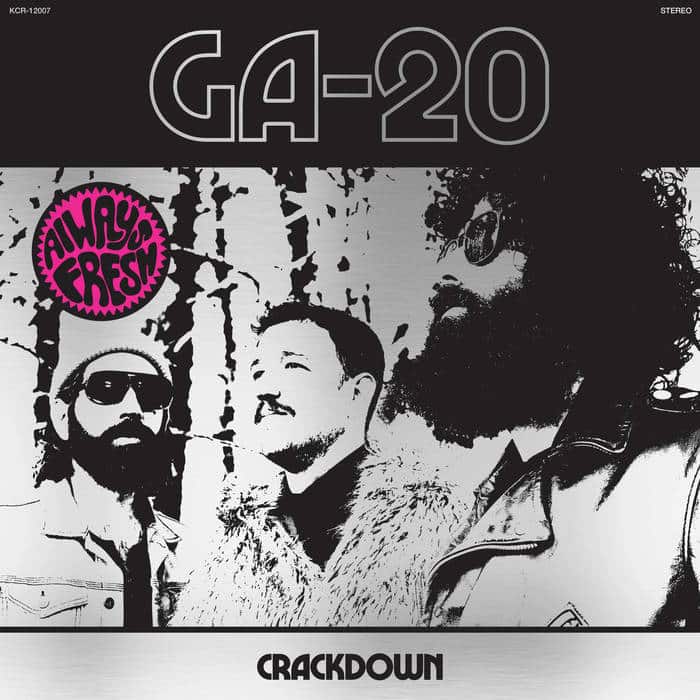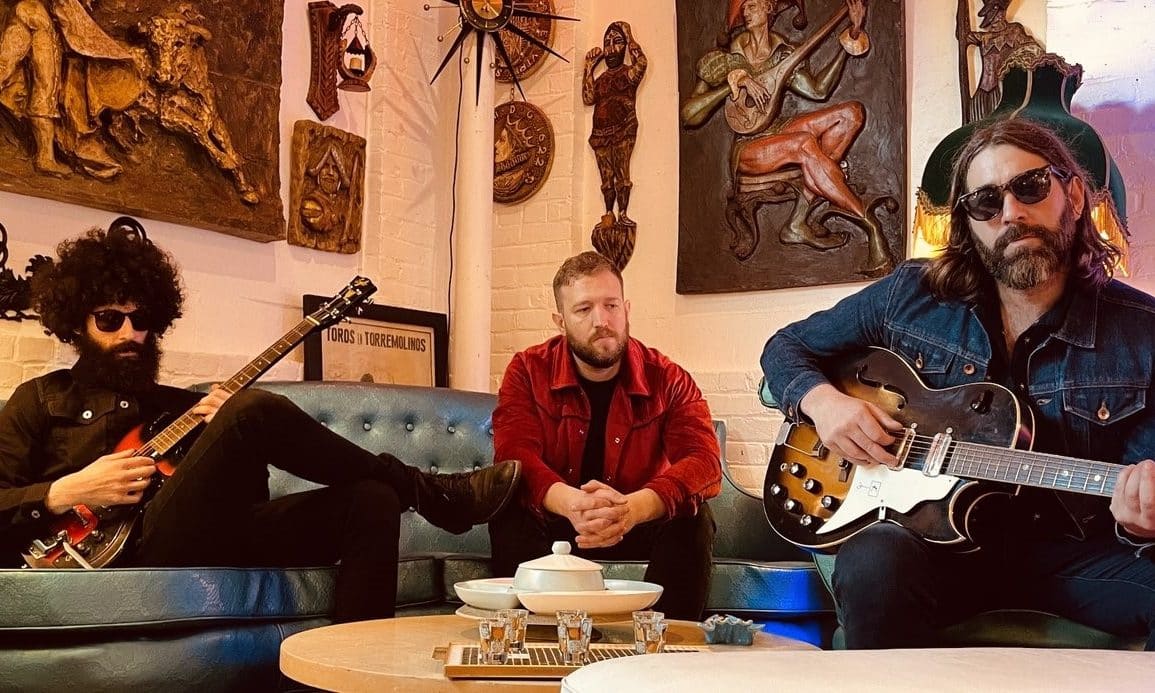On the eve of my conversation with GA-20 guitarist Matthew Stubbs, the band won Blues Artist of the Year at the Boston Music Awards and performed a celebratory set. At this point, accolades for the blues trio are a given. Since 2018, the group has affirmed the form’s timelessness, metabolizing their love of traditional blues into records that satisfy fedora-clad diehards and waylay the uninitiated. As was the case of the original bluesmen, GA-20’s sound is a reaction to both location and circumstance. Stubbs and guitarist and vocalist Pat Faherty united out of necessity. A mutual love for artists like Otis Rush, Howlin’ Wolf, and Freddie King was one precipitator, but so was the weight of disenchantment.
Frustrated by a local scene that ignored the music they loved, Stubbs and Faherty formed GA-20, whose purpose was not so much enshrining the blues but thrusting it into the present tense. Their debut Lonely Soul was an out-of-nowhere consummation of that purpose, while the follow-up Try It…You Just Might Like It!– a tribute to Hound Dog Taylor (“The Ramones of Chicago Blues,” says Robert Christgau)– inherits the grease and groove of the record’s honoree.
Crackdown— GA-20’s third record to debut at number one on Billboard’s Blues Albums chart– is their most realized work, a 28-minute blast of hip-flask testimonies of the human condition that delights in Chicago blues but also flirts with the R&B insanity of early ’50s heretics like Little Richard and Lloyd Price.
Last January, GA-20 brought their traveling house party to Grant’s Lounge, and they return to the scene less than a year later on Thursday, January 12th with Tyler Bryant and The Shakedown.
CF- Congratulations on the award last night. How do you guys stay grounded at this point?
MS- We never expect to get any of that, so we’re very grateful that people dig it. We just like making records and playing live, so if those things help spread the word and get people to our shows and get people to find out about our albums, then that’s all that matters to us.
Did you anticipate an audience for this kind of music? Obviously, you live and breathe the blues, but are you surprised that it still resonates with so many people?
Not really. I don’t think there’s a ton of people doing it right now, and that’s kind of why we started the band. It’s music that we love. When the band started in 2018, Pat and I put the band together because there was not much of that [traditional blues] going on where we live anyway, and people liked it right away. I think the biggest thing is just introducing people. I don’t think a lot of people are hip to– at least in different areas of the country– traditional blues. They’re pretty familiar with blues rock or more modern blues stuff, blues stemming from the ’50s or early ’60s and early ’70s. I don’t think especially younger people, they might just not be exposed to it yet.
Last time we spoke, you said this [Crackdown] was on deck, waiting in the wings a bit. How did y’all maintain momentum as you approached a release date?
We ended up sitting on it because everything was shut down, and we couldn’t tour. And then in the meantime, we ended up having the opportunity to make that tribute record to Hound Dog Taylor. So that made it easier because it wasn’t like I was sitting on an album and not releasing or recording stuff. We ended up recording the Hound Dog record [Try It…You Just Might Like It!] after but released it before Crackdown, obviously.
But it was okay. We were pretty focused on that Hound Dog record and we decided to do it, and that was right around when touring opened back up. We were still playing a couple of songs off Crackdown in the set before the record came out. But we were playing all of them, initially, before the shutdown, getting geared up to going towards, so we actually ended up cutting half the record from our live set over the past year just to save new songs for the audience when the record came out. But I’m glad it’s out now. We worked hard on it, but I knew it was gonna come out either way.
One thing I love about Crackdown is that it’s just under 30 minutes. Is that the perfect length for a record?
For a full-length record, I always try to get 10 tunes on there unless they’re really long songs. But all the records I grew up listening to were shorter, like Beatles records or blues records. We try to write songs rather than long guitar solos if the song doesn’t call for it. On this record is a couple longer solos, but mostly if there’s a solo, it complements the song. When we’re done, I’m like, “Alright, how many minutes is it?” I was actually surprised it was under 30. I figured it was in the 30-minute range, but it was a little shorter, but hopefully, people will listen to it twice.
Given the length of the record, do you leave a lot of material on the shelf? Will there be bonus tracks for reissues down the road?
Maybe. There are two songs that came out before the originals that we wrote. We released the digital singles before Crackdown, kinda leading into it. We released those on a limited edition 45 bundle of the first 1000 copies, so people that bought Crackdown through our label as a pre-order had the option to get that 45, so those two songs exist that way. You never know– maybe they’ll get reissued on the LP, too. It depends on what the label wants.

Your latest single is “ATL”, and I’ve read “Easy On The Eyes” was also inspired by Atlanta, after-hours. I was at your last Atlanta show, and I feel like I missed out on the action (laughs)!
It was actually a year or two before that. We went out with my buddy who has a studio in town. He was like, “Oh, come on over.” That was when we first were tourin’. That might have been after our first record, but we had not recorded Crackdown yet. We didn’t even have a hotel that night, so we thought, “Well, we may as well go over and waste some time and play rather than have to go look for a hotel.” We just jammed on a bunch of songs that night, like ideas we had or ideas we just came up with on the fly because it was free studio time. “ATL” came out, and that was the only one we really kept from the recordings from that session, but we did work on “Easy On The Eyes” that night. I’m sure there’s probably a demo of it there, but it’s not the song you hear on Crackdown..
Do you find yourself often inspired by places like that?
Absolutely, whether it’s the gig or just traveling around, or if you have a day off, walking around the city or going eating or seeing another musician, for sure.
Do you find time to write new material while you’re touring?
Not really. The closest we probably get to writing on the road is at sound checks if there’s a riff kicking around my head or Pat’s, and we might jam on it a little bit, or if we come up with a riff at sound check by accident, we’ll record it on a voice memo on the phone or something and then go back. Usually, Pat and I write separately, in our own houses, and then share our rough drafts and then work together on them
Have you toured enough where you have favorite record stores you hit up when you roll into town?
Actually, in Macon, there’s Fresh Produce. We always go there. We did a signing last time we went through with the Hound Dog record. That place is great. We love Plaid Room, which is owned by Colemine Records. That’s one of the cooler, big indie stores. And there’s a recording studio above it, or it used to be– I think they’re moving the studio– but that place is always cool.
With Crackdown, the band is a bit more forward-thinking in its sound. There’s some ’60s garage, some 1950s rock n’ roll. Are you consciously moving away from the strictly traditional blues sound?
I wouldn’t say we’re moving away from it. We’re always gonna be a blues band, but with Crackdown, I do like to evolve. I don’t wanna make the same record every time. Crackdown was recorded right after Lonely Soul. We were all listening to other music that was on the fringe of traditional blues, like country music or soul music or garage rock from the ’60s, and we were all okay with allowing those influences to come in rather than be like, “Well, that’s not complete Chicago Blues from the ’50s,” you know what I mean? We’re okay with it evolving, but I think especially live, we’re definitely a blues band.

I think that shift will be inevitable, as a creator…
We’re trying to write music and bring it to people that might– like I said before– might not know traditional blues. So on a live show, we play a lot of blues, but it’s interesting. For instance, my girlfriend, before me, was not a huge fan of blues music. She’s a huge music nut. And when we put this band together, she would say, “You guys sound like a rock n’ roll band to me.” She was like, “You call it blues,” but to her, because the show is pretty high energy, it’s rock n’ roll. But it doesn’t matter to me what people call it, as long as they like it.
What’s been your favorite description of GA-20 so far?
Tony, our publicist, pulled this quote: “Stripped down and pounding blues that is so raw it makes Jon Spencer Blues Explosion sound like Journey.”
The last time we talked, you spoke at length about the gear you used to record Try It. Are there any new additions to your collection that stand out?
There has been a couple of rig changes for live. Lately, I’m using two Bassman heads. One I just got; it’s a 1961 blonde Bassman. And then I have the other one that I’ve been using– I probably had it when I was there last time– a ‘68 Bassman head. I’m using two of those with two big cabs now, which is a pretty big departure from when we started this band where Pat and I were using 10-watt amps because we’re playing bigger rooms now.
Also, I had this Telecaster last time, but I don’t think we talked about it. Usually, I use vintage guitars, but there’s this company called Waterslide Guitars out of California. They build custom Fender-inspired guitars. That guy built me a custom Tele, and he’s building another one now, basically for touring. It’s a real sturdy, great sounding, great feeling guitar. But it’s new; it’s not vintage.
What’s your dream piece of gear that sits atop your wish list?
Well, about a year and a half ago, I got my hands on a ‘51 Telecaster, and that was always my dream guitar. So, I have it. It was my dream guitar, and I have it now. But there’s always room for another vintage piece if I see it (laughs)!
Can you talk about your fuzz philosophy on tracks like “Fairweather Friend”?
We don’t use fuzz live. On Crackdown, there’s a couple of songs I did have some fuzz guitar and it was just a pedal, an Analog Man Peppermint Fuzz. It’s a Fuzz Face copy. But live, it’s really just the way I set the amp and the way I play the instrument, so I can get the fuzz out a little bit.
How do you and Pat cover the low end in lieu of a bass guitar?
Pat and I both use two amps live. For the recording process, we don’t usually. Sometimes we do, but not really. but live, we have one that stays loud and clean, and then we have another that goes a little dirtier. You push it a little harder, keeping the loud clean tight and hopefully we have a good soundman that understands what we’re trying to do, so they can EQ it upfront.
We’re having this conversation at the tail end of 2022. Any artists you’ve fallen for this year?
Especially with streaming these days, I love vinyl, but we’re on the road so much, so I spend a lot of time just streaming. I can’t always remember the name of the album, but there are a couple of artists. Sierra Ferrell is a country artist. She’s great; she’s blowing up. I listen to her a lot. I like the way her records sound. There’s another country-inspired artist called Nick Shoulders. He’s pretty killer. I listen to him. And then I love King Gizzard and The Lizard Wizard, which is not blues, but psyche rock or shred. They put out so many records, it’s hard to keep up now. And then I’m always listening to old blues too, like old classic blues records. One that I always go back to is Otis Rush’s Mourning In The Morning, which was recorded down south. I think Mike Bloomfield um produced it. That’s a killer record.
King Gizzard is beyond prolific, but you guys have steadily released material as well. If I recall, you have a live album that’s ready to drop?
We have a live record coming out March 17th, so we’ll start dropping singles for that next month. And then we have one more studio album done and ready to go. I’m not sure when it’s gonna come out, but probably a year from this March maybe, so the next two are all ready to go. And we’ve started writing for the next studio album as well, so hopefully we’ll get that done this year.
Charlie Farmer is a Georgia writer and professor who loves his wife, his daughters, his students, his cats, his books, his LPs, and everything else one should love in life.
